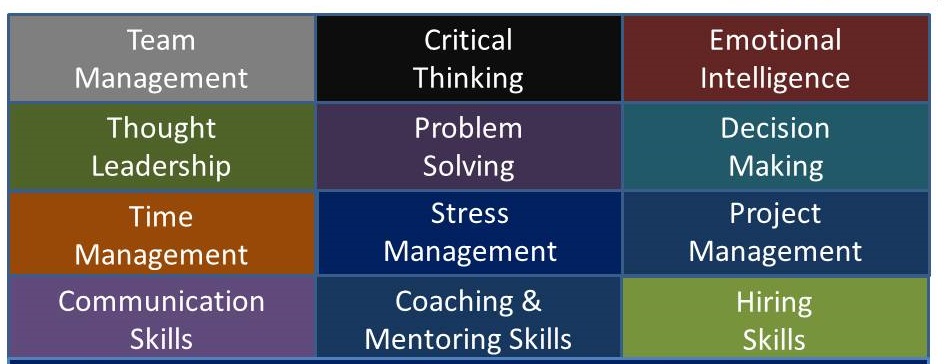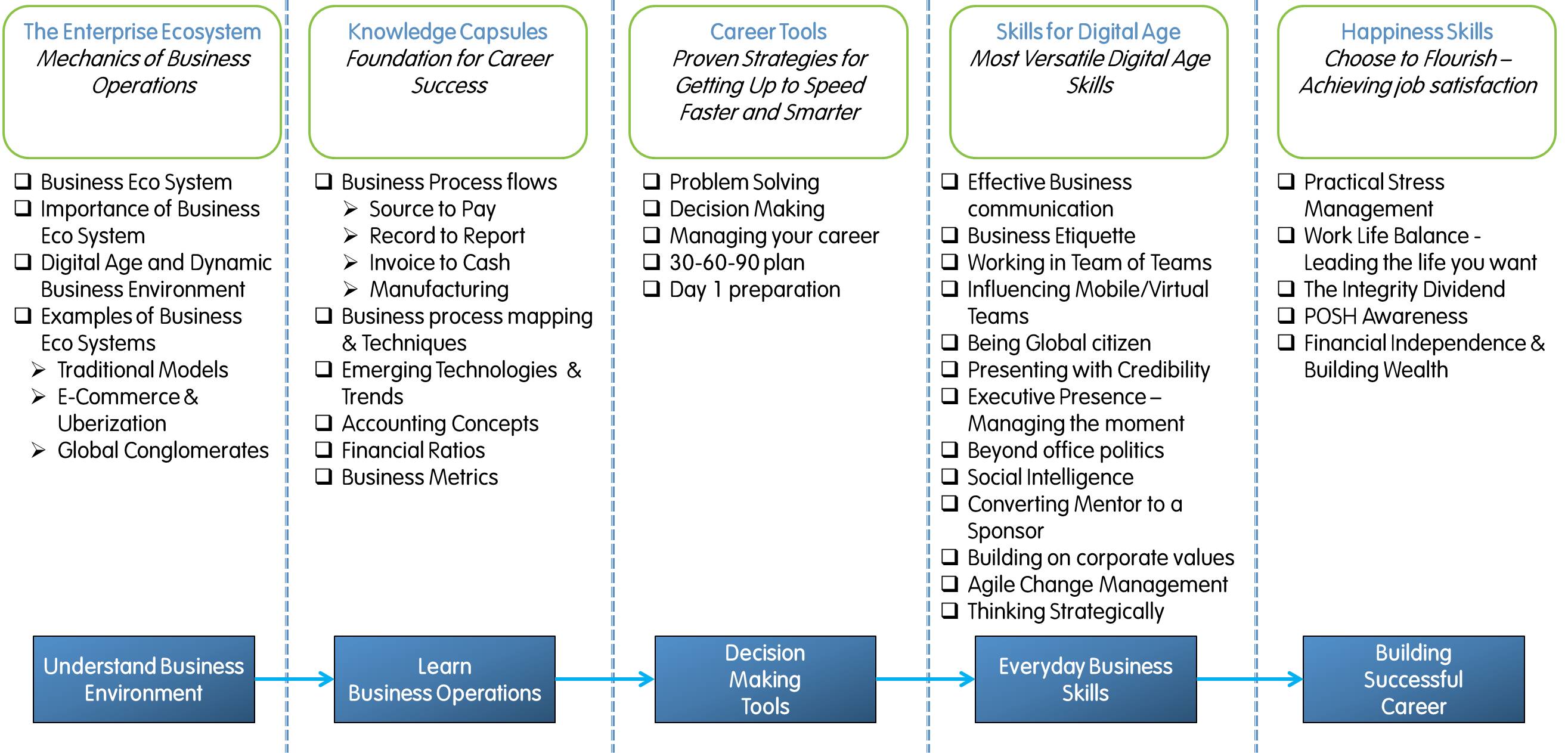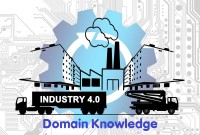- Home
- Business Processes
- Industry Knowledge
- Aerospace Industry
- Automotive Industry
- Banking Domain
- BFSI Industry
- Consumer/ FMCG Industry
- Chemicals Industry
- Engineering & Construction
- Energy Industry
- Education Domain
- Finance Domain
- Hospitality Domain
- Healthcare Industry
- Insurance Domain
- Retail Industry
- Travel and Tourism Domain
- Telecom Industry
- Leadership Skills
- eLearning
- Home
- Leadership
- Career Management
- Develop your Leadership Skills
Develop your Leadership Skills
There are a number of broad skill areas that are particularly important for leaders. Today's demanding global business landscape is defined by relentless change and rising business complexity, bringing new challenges. Leadership skills provide career-enhancing resources and support you to be exceptionally successful in your career. Leaders need to provide direction to their teams and need to be able to make good and timely decisions to define and support strategic direction for the enterprise.
"The true mark of a leader is the willingness to stick with a bold course of action — an unconventional business strategy, a unique product-development roadmap, a controversial marketing campaign — even as the rest of the world wonders why you're not marching in step with the status quo. In other words, real leaders are happy to zig while others zag. They understand that in an era of hyper-competition and non-stop disruption, the only way to stand out from the crowd is to stand for something special."
-Bill Taylor
Importance of Leadership Skills
Unfortunately, many leaders don’t have access to various tools and skills that can help them navigate through the complexities of today’s dynamic business environment. Leadership skills embrace comprehensive management and leadership, team management, decision-making, project management, personal productivity, creativity, problem-solving, and communication skills helpful in addressing career problems, and guide you on how to advance your career in a positive and seemingly effortless way.
Leadership skills can help you become exceptionally effective, be a great manager and leader, and most importantly be more successful in your career. Leadership skills when combined with relevant domain and functional expertise can transform your entire career growth and help you have a fulfilling career. Leadership skills are necessary for the further growth of organizational leaders at all levels.
Leadership Skills – Definitions and Examples
A strong leadership foundation ensures the following:
1. Accountability:
- Accountability means a willingness to accept responsibility for one's actions
- Accountability for defined work assignments
- Feels accountable for team tasks and responsibilities
- Defined ownership and holds employees responsible for accomplishing business goals.
2. Coaching
- Coaching gives the individual an opportunity to define their career goals in a realistic way
- Hands-on knowledge to colleagues depending on requirements
- Is proactively training less experienced colleagues
- Leaders should establish rhythms and coach employees toward achieving goals
- Should be able to drive an increased level of engagement
- Inspires team for a deeper level of learning
3. Teamwork & Team Management
- Ability to handle team effectively of different strengths including virtual team management
- Acts as an integrating and stabilizing team member
- Integrates colleagues proactively into the team
- Enables and forces exchange
- Effective project management skills with knowledge of project management methodologies, tools, and techniques.
4. Entrepreneurial Thinking
- Ability to see things differently
- Understands and knows the business strategy of his/her country
- Acts partly as a role model for entrepreneurial thinking
- Identifies marketplace opportunities and discover the most appropriate ways and time to capitalize on them
5. Potential
- Identified talent with industry expertise
- Talents are people who the company want to retain and invest in for the future of their organization
- Stress management and keeping your cool under aggressive timelines and pressures.

6. Analytical Thinking & Critical Thinking
- Effective Decision-making skills
- Problem Solving and analytical skills to analyze a problem and provide solutions to the business.
- Is very thorough in diagnosing possible problems and analyzing data
- Takes an analytical approach to problem-solving and uses root cause analysis
- Ability to think critically and come up with out of box solutions and; build sustainable and cost-effective solutions.
7. Motivation / Inspiring
- Coaching and mentoring skills to make future leaders from your team members.
- Hiring skills to ramp up an effective and successful implementation team.
- Mobilizes commitment and creates an environment that encourages and supports participation, creativity, and flexibility
8. Proactive Learning
- Thought Leadership to create value for business
- Highly proactive about developing and acquiring new skills, knowledge, and capabilities
9. Flexibility
- Time management and project time management skills
- Recognizes the need for change and inspires others to embrace change to drive business performance
- Is geographically mobile
- Emotional Intelligence and empathy.
10. Communication
- The most important skill required of leaders.
- Communication skills with the ability to present based on the needs of the audience.
- Presents to Senior Leadership
- Uses concise & clear communication
- Expresses ideas effectively in individual and group situations
- Adapts language and terminology to the audience
How TechnoFunc helps to build Leadership Skills?
TechnoFunc is providing you with free tutorials that help you learn the practical, straightforward skills you need to excel in your career. This is a free resource where leaders at all levels can develop the higher knowledge and skills necessary to address the increasingly complex and critical nature of their roles. These tutorials have been presented in the most understandable ways to help anyone can learn and use these simple processes and techniques to make the very most of their careers. This section contains more than 1000+ leadership resources including team-building, communication, and career excellence skills, to help leaders become more confident in business acumen, financial literacy, team leadership, critical thinking skills, talent leadership, leadership accountability, and change management. The articles and video tutorials in this section help you develop your leadership skills so that you can become an exceptional leader.
Browse specific tutorials by clicking on the leadership area of your interest. Click here to see the tutorials available under leadership skills.
- Leadership Styles - Learn more than 60 Leadership Styles
- Leadership Theories - Learn 30+ Leadership Theories and their practical applications
- Career Management - Get the Career You Want
- Change Leadership - Effectively Handle Change
- Communication Skills - Listen, Talk and Reflect
- Creativity Tools - Let Your Creative Juices Flow
- Decision Making - Lead Your Way
- Management Concepts - Build a Strong Management Foundation
- Problem Solving - Sustainable Solutions to Problems
- Project Leadership - Project & Program Management
- Strategy Tools - Strategic Thought Leadership
- Stress Management - Bring More Happiness
- Team Leadership - Build Effective Teams
- Time Management – Manage your time effectively

“Before you are a leader, success is all about growing yourself. When you become a leader, success is all about growing others.”
– Jack Welch
Related Links
You May Also Like
-
Stress is a product of the busyness of modern life. It has assumed grave dimensions ever since the emergence of industrialism. In fact, stress is a natural, ongoing, dynamic, and interactive process that takes place as people adjust to their environment. Stress can be brought about by positive or negative life events. Distress can cause disease and eustress or positive stress can promote wellbeing and increased productivity. Learn to recognize and be responsible for your stress, and learn the ways to manage stress.
-
Guide to Technical Leadership Skills
Technical leaders care about building amazing products and the best technical capabilities in their teams. Everything they do is focused on improving the user experience and bringing competitive advantage for their organization. Learn the skills and competencies you need to build a technical career path for yourself that starts with building technical expertise and grows into developing technical leadership.
-
Navigating your career journey will hopefully include a series of experiences that challenge your skills and abilities in ways that are satisfying and rewarding. Only you can manage your career. That means you must determine what things you are passionate about, what your goals are, both professionally and personally, and how much energy you are willing to invest along the way. Learn how to build an effective career path framework for yourself.
-
In today's business world, proficiency in management skills is essential for career growth and success. Managerial skills can be defined as attributes or abilities that are essential for every leader and manager to succeed and fulfill specific tasks expected from them by the organization.
-
A manager or an employee in an organization who is experiencing a high level of stress may develop high blood pressure, ulcers, irritability, difficulty in making routine decisions, loss of appetite, accident proneness, and the like. These can be subsumed under three general categories, physiological, psychological, and behavioral symptoms. Stress can give rise to a number of changes.
-
In our present Hitech scenario, society is changing very fast. What are the skills that are most relevant for leaders in relation to the changing economic environment? Leaders need to develop skills to drive innovation and change in order to play a more central role in their organizations’ activities. How do managers accept the change and meet business expectations by becoming a key figure in driving change and innovation?
-
“Level 5 Leadership”, this term was coined by Jim Collins in his book “Good to Great” and it is all about achieving "Greatness" as a leader. This article will explain what we mean by Level 5 Leadership and what the characteristics of a Level 5 leader are. What it takes to achieve greatness as a leader, and what are the steps and strategies that one can use to move up to this top level of leadership.
-
What are some of the smartest things you can do in your early career that can help you become successful? The more you challenge yourself early on and gain a multitude of experiences and skills, the more successful you'll become down the road. In this article, we have compiled our best career advice including tips from career and recruitment experts. Here are some important tips to keep in mind as you plan your education and training, your career, and your life.
-
Building Your Domain Knowledge
Domain knowledge from a career management perspective encompasses the understanding of industry dynamics and business processes of the target operational area. Domain expert exhibits clear knowledge in the respective industry and understands the industry concepts in general. It is always recommended to best highlight your exposure of domain in your resume or cover letter. TechnoFunc provides you with the best tutorials to gain domain knowledge in a large number of industries and business areas.
-
Reasons behind Wastage of Time
Under-utilization of time may be due to the faulty system or faults of manager/officer/leader or due to lack of planning. There could be many factors driving the procrastination behavior like system issues, personal work habits, and lack of delegation, personality traits, and bad working habits of the leader, failure to tackle interpersonal conflicts, obstacles, and lack of far-sightedness.
Explore Our Free Training Articles or
Sign Up to Start With Our eLearning Courses

About Us
Learning
© 2023 TechnoFunc, All Rights Reserved










